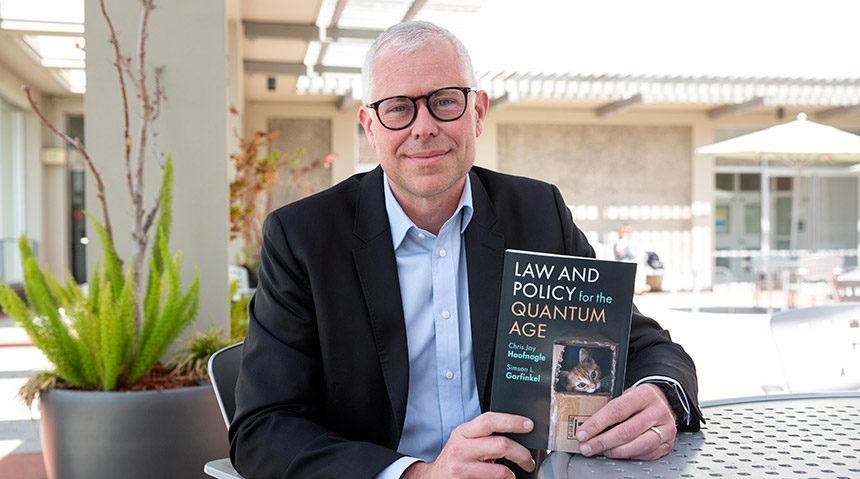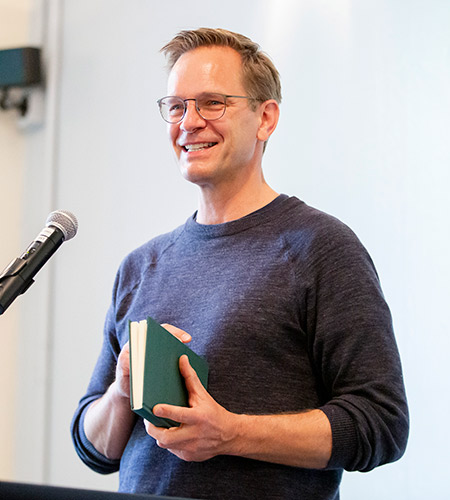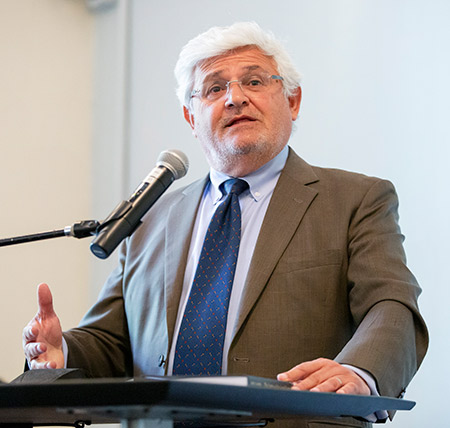
By Andrew Cohen
Deeply personal essays on race, gender, and the body. Revealing insights about the reach and limits of presidential power. Timely assessments of quantum technologies and their far-reaching implications.

True to form, Berkeley Law’s faculty cranked out a trove of compelling books last year that probe a wide swath of meaningful issues. At a recent celebration of those 39 publications presented by the school’s law library, colleagues shared their perspective on several of them — and why they resonate so strongly. You can see all of the faculty’s 2021 books here.
In Don’t Let It Get You Down: Essays on Race, Gender, and the Body, Thelton E. Henderson Center for Social Justice Executive Director Savala Nolan ’11 delivers a powerful collection of essays that offer poignant reflections on living between society’s most charged, politicized, and intractably polar spaces — black and white, rich and poor, thin and fat.
Calling the book “bravely intimate,” Professor Russell Robinson described how Nolan confronted specific attributes of the body (including shame felt about the size of her feet and how they compared to the feet of a white male lover) and how rarely scholarship on race and gender does that.
“Savala forces us to think closely about weight, height, skin color, hair texture,” Robinson said. Extolling the book as “unflinching and breathtaking in its exploration of interracial relationships,” he said it “requires us to lean into discomfort to understand race, gender, and ultimately ourselves.”

In Contested Ground: How to Understand the Limits of Presidential Power, Professor Daniel Farber synthesizes history, politics, and settled law while illuminating issues that stoke hotly contested debates about the limits of and checks on presidential authority — and describing how crucial it is for the same rules to apply to all presidents.
Fellow professor and constitutional law scholar Jennifer Chacón credited Farber for providing a thorough yet accessible road map for people to think about presidential power, one that enables them to grasp the ways in which constitutional interpretation has shaped it.
“This book provides an explanation for people who care about their country, their democracy, and how the world works in concrete, clear, and meaningful prose,” she said. “It’s clear what a wonderful teacher Dan must be. I am inspired by this book, I am grateful for it, and my answers will be better the next time someone asks, ‘Can he do that?’”
In Law and Policy for the Quantum Age, Professor Chris Hoofnagle and co-author Simson Garfinkel dig into how the rise of quantum technologies will affect countries and their citizens. Detailing the history of these technologies and how they work, the authors lay out how they will likely be used for future national defense, how companies may (or may not) profit from them, and what the legal terrain entails.

Professor and fellow privacy law expert Paul Schwartz outlined how the book explores the technologies’ eye-opening policy implications, and why it calls for the United States to start preparing for them.
“Chris has been helping people understand law and tech for many years now,” Schwartz said, adding that he deftly provides a “witty, easy to read book that helps people from different disciplines understand the interplay” between them.
In Justice, Justice Thou Shalt Pursue: A Life’s Work Fighting for a More Perfect Union, Professor Amanda Tyler — a former clerk and good friend of recent Supreme Court Justice Ruth Bader Ginsburg — offers a curation of Ginsburg’s legacy that traces her work for gender equality and a “more perfect Union.”
Dean Erwin Chemerinsky explained how the book is divided into five parts, opening with an edited transcript of Tyler’s interview with Ginsburg before a packed audience at Zellerbach Hall during her visit to Berkeley in September 2019 for the inaugural Herma Hill Kay Memorial Lecture. It also unpacks her early career as a legal advocate, some of her memorable Supreme Court opinions, and unpublished essays she wrote late in life, and closes with an afterword Tyler wrote the month after Ginsburg’s death.
“I was struck by how well these different parts of the book fit together, the impact of Justice Ginsburg’s amazing life and career, how well edited this book was, how Justice Ginsburg was such a passionate voice for justice, and how much we miss her,” Chemerinsky said.

In Paving the Way: The First American Women Law Professors, the late Herma Hill Kay — who taught at Berkeley Law for 57 years and served as the school’s first female dean — tells the stories of the first 14 female law professors at ABA- and AALS-accredited law schools in the United States. The 15th such professor, Kay labored over their stories to present a history of their inspiring paths for the 2,000-plus current female law professors.
Professor Catherine Fisk ’86 conveyed her appreciation of the book’s historical lessons. Her faculty chair is named after Barbara Nachtrieb Armstrong, Berkeley Law’s first female law professor and the first at a law school of a major university — as well as the only woman on the faculty until Kay was hired in 1960.
Noting how Kay’s career reflected her book’s title, adding “many of you in this room watched it close hand,” Fisk highlighted one of the book’s anecdotes about University of Wisconsin law professor Margo Melli. When she and her husband wanted to adopt a child in the early 1960s, Wisconsin’s Department of Social Services rejected their wish because Melli was a working mother.
“So she stopped working, reapplied to the law school after the adoption, and was hired again in 1962,” Fisk said. “It shows the theme running throughout the book from these pioneering women: resilience, creativity, and finding a path even in the face of enormous obstacles.”